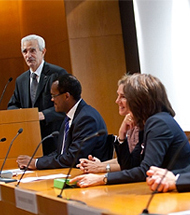Social impact of the research in tropical health

PHOTO: Manuel Castells
In September 2006, Professor Antonio Monge, from the School of Pharmacy, is the opening speech of academic year. Antonio Monge reads his speech "research and medicines. Cooperation: challenge and opportunity for countries at development". Among others, he provides the following data:
"In the last 25 years, the pharmaceutical industry has introduced 1,400 new entities. Of these, only 13 were for tropical diseases and 3 for the treatment of tuberculosis.
Ninety percent of global pharmaceutical sales are made in developed countries.
Ninety percent of the world's 14 million annual deaths from infectious diseases occur in countries at development. Approximately 2 million people die annually from tuberculosis. Five percent in developed countries. Approximately 1 million people die annually from malaria. 90% in Africa. Between 10 and 20 million people suffer from Chagas disease in Latin America.
We must try to promote and support global activity in the study of these diseases. The goal is to provide greater support to the basic and strategic research , improving coordination at the international level and creating platforms for clinical trials, while enhancing the capabilities of developing countries development , which should participate in all stages of the research process. This participation should be sustained and should serve to train scientists and technicians from developing countries development ".
This speech had a lot of echo. Academics, politicians and the general public were shocked and a special awareness of the so-called neglected diseases that relentlessly plague the Third World was triggered.
In October 2011, the University created the high school Tropical Health. The high school seeks to bring basic research closer to clinical application, at partnership with hospitals and centers at research in developing countries development. Its goal is to find solutions for diagnosis, treatment, prevention, and control of diseases prevalent in these areas. It seeks to achieve an active participation of the host countries by collaborating in the study of the diseases suffered by their citizens, so that technology transfer can take place and help in the training of researchers.
Iciar Astiasaran
Vice President from research
University of Navarra





